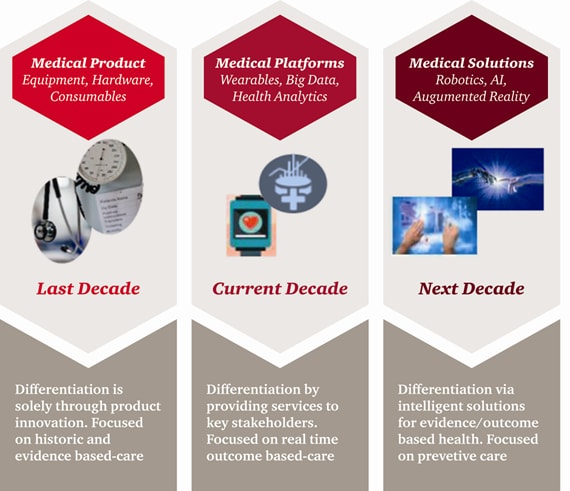Artificial intelligence in health
How artificial intelligence may improve quality and efficiency, whilst reducing healthcare costs in Europe
Converging of various megatrends, such as, aging of the population, high cost of healthcare, coupled with patients becoming more value-focused, is creating a scenario in Europe where AI based technologies could help optimise healthcare. It is not hard to imagine a future with intelligent technologies helping us diagnose diseases faster, and assisting doctors in treatment decisions, armed with evidence based analysis of likely outcomes.


We analysed the potential benefits from AI applications in healthcare by deep diving into three care pathways. These three pathways act as a representation of the huge benefits that could accrue from AI use and at the same time, the medical dilemmas it is expected to create.
- Prevention of childhood obesity: AI use could yield cost saving of up to EUR 90 billion over the next ten years. This saving estimate includes benefits from lower medical costs, and reduced losses from lower productivity and sick days. AI could also help in increasing the efficiency of self-monitoring for preventing obesity.
- Diagnosis of dementia: AI use could help save up to EUR 8 billion in diagnosis cost over the next ten years, largely driven by increased rate of diagnosis at primary care level. AI can help diagnose with up to 90 percent accuracy, bringing it to a large proportion of dementia patients who never receive a formal diagnosis.
- Diagnosis and treatment of breast cancer: AI use for diagnosis and treatment of breast cancer could be very helpful in early detection, also helping in treatment decision making and reducing doctors’ direct engagement in potentially repetitive tasks. It could help save up to EUR 74 billon over the next ten years, if used on a large scale.
However, achieving these benefits will not be easy. A number of challenges will need to be addressed in course of time to achieve benefits of this magnitude. Predominant among them are, availability of large, mature datasets that will enable algorithms to deliver on complex medical conditions, development of data standards and privacy regulations, and heavy investments from stakeholders. According to various experts we interviewed, technical, legal and financial feasibility of adopting AI will be critical. Equally important, will be to assess the psychological feasibility - is the public actually ready and receptive to AI adoption in health? The first few steps that would help in the realisation of this vision include:
- Introducing a balanced scorecard in policy making, that will ensure that the focus is not restricted to any one policy area, such as: improving the quality of healthcare; or containing the cost of care.
- Moving quickly and consistently on regulations will ensure that the vision on AI within the healthcare industry is matched and supported by timely regulations.
- Redefining reimbursements to support outcome based care will alleviate any payer related concerns for providers and patients, providing the much needed development boost to AI tools.



















